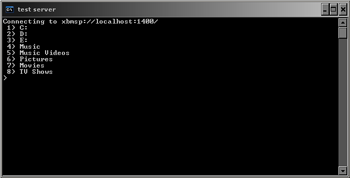XBMSP
(Redirected from Xbms)
Jump to navigation
Jump to search
- FAQ'S
- XBMC's Inner Workings
- Development Notes
- Python Development
- Skinning XBMC
- List of Built In Functions
- Web Server HTTP API
- The XBMC Database
- Audio Players
- Video Players
- Scrapers
- HOW-TO write Media Scrapers
- Regular Expression Tutorial
- PAPlayer
- MPlayer
- DVDPlayer
- Appendixes
- References
- Point Releases
- HOW-TO's / Tips & Tricks
- Mods to XBMC and Xbox
- Disclaimer
- Thanks
The XBMS Protocol
- XBMC's network-protocol is specificly designed to stream audio, video and pictures. XBMSP (XBMC Media Stream Protocol) or XBMS for short is one of the easiest and most functional ways to stream media from your PC to XBMC. Your shares are configured using a user-friendly server-program on your PC and can be used without any additional configuration to XBMC, although you are able to create source links to individual shares if you so desire.
- In order to use this method, you need to download and install CCXGui. There are two versions available, the full version and lite. The lite version is newer and more up to date, although it limits you to a single share, whereas the full version does not enforce a limit.
How to configure XBMS in XBMC
Simple Configuration for Novice Users
- XBMS can be used with no additional configuration by simply selecting the XBMSP Network Share (Auto Discover) source which is included in Pictures, Videos and Music by default. When you select this source, XBMC should display all of your shares that you set up on your PC and you are able to browse through them as though all of the files were stored locally on the Xbox.
Advanced Configuration
- With a few simple additions to Sources.xml, you can vastly improve the functionality of your shares. By adding sources that point to the individual shares, your can browse directly to them from Pictures, Videos and Music.
- For general information regarding sources, see Media Sources. In order to set up your sources you need to know the IP address of your PC.
- Like all sources, XBMS sources need to contain two pieces of information:
- The <name> tag - This indicates what XBMC will display as the name of the source
- The <path> tag - This indicates where the information is actually located
- For the purpose of these examples, I will use 192.168.1.100 as the IP address of the PC where the shares are located. For your configuration, simply substitute the IP address of your computer.
|
Configuring your Main XBMS Source |
<xml>
<source>
<name>XBMSP Network Share</name>
<path>xbms://192.168.1.100:1400/</path>
</source>
</xml>
|
|
Linking Directly to your Shares
|
<xml>
<source>
<name>Music</name>
<path>xbms://192.168.1.100:1400/music</path>
</source>
</xml>
|
How to configure CCXGui on your Windows computer
- For the purpose of this tutorial, use the full version of CCXGui.
|
|
|
|
|
|
How to configure ccxstream on your Linux/UNIX/BSD/POSIX computer
- Install a ccx-server or deamon (like ccXStream (for Linux)) or ccXStream (for UNIX/BSD/POSIX) on your Linux computer/server, and configure it to share folder/folders.
- Note: The 2 given links didnot work when i tried it, maybe you have to google to find what you are looking for.
- The ccxstream server source includes a program 'ccxtest' which can be used to check the daemon is operating correctly. It is built along with the ccxstream server when you build the program from source. If you installed via a package such as RPM or deb, then check the contents to see it it was included.
- To test simply run 'ccxtest', by default it will connect to locahost port 1400 so unless you changed the port or are connecting from a remote system it should connect to the server, display the connection parameters and list the shared resources in the root folder. They 'help' to get a list of commands you can use.
How to build/compile ccxstream on Solaris
- The current ccxstream source package on sourceforge does not build on Solaris. To fix, edit the Makefile and change the linker libraries from:
- LDFLAGS+=-lreadline -ltermcap
- to
- LDFLAGS+=-lnsl -lsocket -lresolv -ltermcap
- Also, Solaris does not define the symbol INADDR_NONE so if you wish to build cxxtest you will need to edit ccxclientconn.c and add the following
- #ifndef INADDR_NONE
- #define INADDR_NONE ((unsigned long) -1)
- #endif
- After the line #include "ccxclient.h"


